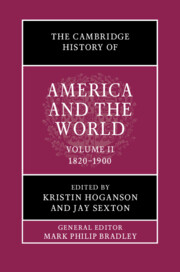Book contents
- The Cambridge History of America and the World
- The Cambridge History of America and the World
- The Cambridge History of America and the World
- Copyright page
- Contents
- Figures
- Maps
- Tables
- Contributors to Volume II
- General Introduction: What is America and the World?
- Introduction to Volume II
- Part I Building and Resisting US Empire
- Part II Imperial Structures
- 9 The US Fiscal-Military State and the Conquest of a Continent, 1783–1900
- 10 The United States and International Law: From the Transcontinental Treaty to the League of Nations Covenant, 1819–1919
- 11 The United States and Global Capitalism
- 12 Making the First International: Nineteenth-Century Regimes of Surveillance, Accumulation, Resistance, and Abolition
- 13 The Military and US Engagements with the World, 1865–1900
- 14 Technology and US Foreign Relations in the Nineteenth Century
- 15 The Environment, the United States, and the World in the Nineteenth Century
- Part III Americans and the World
- Part IV Americans in the World
- Index
9 - The US Fiscal-Military State and the Conquest of a Continent, 1783–1900
from Part II - Imperial Structures
Published online by Cambridge University Press: 12 November 2021
- The Cambridge History of America and the World
- The Cambridge History of America and the World
- The Cambridge History of America and the World
- Copyright page
- Contents
- Figures
- Maps
- Tables
- Contributors to Volume II
- General Introduction: What is America and the World?
- Introduction to Volume II
- Part I Building and Resisting US Empire
- Part II Imperial Structures
- 9 The US Fiscal-Military State and the Conquest of a Continent, 1783–1900
- 10 The United States and International Law: From the Transcontinental Treaty to the League of Nations Covenant, 1819–1919
- 11 The United States and Global Capitalism
- 12 Making the First International: Nineteenth-Century Regimes of Surveillance, Accumulation, Resistance, and Abolition
- 13 The Military and US Engagements with the World, 1865–1900
- 14 Technology and US Foreign Relations in the Nineteenth Century
- 15 The Environment, the United States, and the World in the Nineteenth Century
- Part III Americans and the World
- Part IV Americans in the World
- Index
Summary
The United States was born in a revolution against Britain’s attempt to strengthen the control of the imperial government over its distant colonies. Yet once independence was achieved, the erstwhile colonists constructed a central state apparatus far more powerful and far costlier than anything Britain had envisioned in the 1760s and 1770s. This ironic development followed directly from American independence, which turned thirteen colonial dependencies into a sovereign nation within an intensely competitive transatlantic state system. Once the 1783 Treaty of Paris had secured nominal independence, the leaders of the new republic sought to replace the military and governmental institutions and the commercial and diplomatic policies that had allowed the North American colonies to thrive under the protection of the British Empire.
- Type
- Chapter
- Information
- The Cambridge History of America and the World , pp. 221 - 245Publisher: Cambridge University PressPrint publication year: 2022



